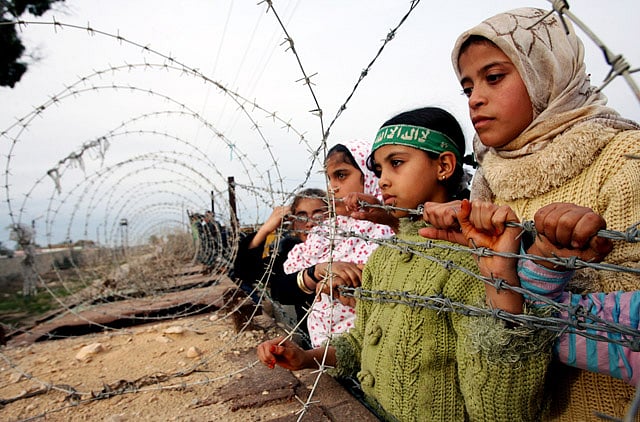Ramallah: Many Palestinians in the Gaza Strip are worried that once the steel barrier, under construction by Egypt on the border with Gaza, is finished, it will complete a suffocating siege of the Strip. The steel barrier slices through hundreds of smuggling tunnels in Gaza.
Other Palestinians are less concerned with the barrier and want to see an end to the smuggling of drugs, weapons and low quality goods from Egypt that have flooded the Gazan market and are being sold at high prices. But they seek guarantees that Israel and Egypt would keep the flow of commercial and basic goods into Gaza.
Israel's siege has invited harsh criticism by the Palestinian National Authority and by the international community. Israel counters that easing of the blockade would strengthen the Hamas rulers.
Normal Palestinians in Gaza Strip have been devastated by uncertainty and fear of deprivation since the southern enclave's borders have been virtually sealed afer Hamas' election victory in 2006 and its violent takeover of Gaza in 2007. People have become accustomed to stocking food for fear of the unknown.
Shortage of food
"We are worried because we don't know what will happen when the wall is completed. Will we be completely imprisoned in Gaza, will we suffer severe shortages of food and goods? With every development, we lose whatever hope we have left of seeing salvation," Abu Mustafa, 56, from Khan Younis, said.
Nadia, a former government employee in Gaza City who refused to give her full name, said the people most harmed by the Egyptian barrier were the smugglers, tunnel owners, merchants and Hamas rulers.
"For many people in Gaza, Hamas' escalation of tensions with Egypt is seen as part of its attempts to use Arab public opinion against Egypt to help break the siege."
Hamas' control of Gaza partly depends on cash and goods, including weapons entering through the tunnels. Smuggling under Hamas has flourished as Israel restricts the entry of basic and commercial goods through border crossings and refuses to reopen the Rafah border to normal traffic of people as long as Hamas controls Gaza.
Hamas leaders have denounced the steel barrier, saying it would further choke Gaza and has sought to rally Arab public opinion against it. Anti-Egypt and anti-barrier demonstrations were held in Jordan and Lebanon, with protesters denouncing Egypt's role in completing the Israeli siege of Gaza.
Hamas has also commanded Muslim religious leaders to issue fatwas decreeing that the barrier was forbidden in response to an Al Azhar fatwa that it was religiously permitted.
As part of what became known as "the war of fatwas" between Egypt and Hamas, a statement published by a Hamas source on the group's website said: "We ask: Is this barrier for the protection of Egypt's national security from Zionist occupation that occupies Arab land, or is it a wall that prevents the entry of milk and medicine for children and the sick besieged in Gaza for the past four years?"
Tensions between Hamas and Egypt mounted on Wednesday after an Egyptian soldier was killed and four Palestinians were injured in a gunbattle in Rafah during a protest against the anti-smuggling wall Egypt is building.
In a separate incident in the Egyptian port city of Al Arish, 40 km from the border with Gaza, violent confrontations took place between Egyptian security forces and foreign activists travelling with a convoy carrying aid supplies to Gaza.
Palestinian Prime Minister Salam Fayyad condemned the killing of the Egyptian soldier, saying, "It was a very dangerous, shameful and condemned act. This irresponsible act targets Egyptian efforts to achieve Palestinian unity."
Palestinian Minister of Islamic Waqf Affairs Mahmoud Habbash said the attack would serve Israel's interests which seek to throw Gaza in Egypt's lap, a move that harms the Palestinians and the Arabs.
Desire to live
The incident raised questions over future relations with Egypt. People in Gaza say they simply want to live.
Palestinians say there were 800-900 tunnels under the 14-kilometre border between Gaza and Egypt, employing some 1,500 Palestinians and benefitting thousands of merchants.
The Rafah municipality supplies electricity and imposes taxes up to $2,500 (Dh9,182) per tunnel. Arab diplomats said recently there have been reports of Moroccan and Egyptian girls brought through the tunnels to work as either maids or prostitutes. Many Palestinians have been killed in the tunnels.
According to a recent report by the United Nations Office for the Coordination of Humanitarian Affairs (OCHA), "though posing high risks to their lives, the population of Gaza remain forced to use poorly-constructed tunnels as a substitute for transporting goods, which is otherwise restricted through commercial crossings. Since the end of Israel's "Cast Lead" offensive reportedly 64 Palestinians have been killed and 120 others were injured in various tunnel-related incidents."
The tunnels have been a source of concern for Egypt and Israel, especially after reports that Hamas and militant groups in Gaza have succeeded in bringing in long-range missiles and sophisticated weapons.
Hamas officials, accusing Egypt of building the wall at Israel's bidding, have hinted at a renewed border breach. Two years ago Hamas gunmen cut down a metal border wall erected by Israel that allowed tens of thousands of Gazans to pour into Egypt.
A senior Arab diplomat said Egypt has been working on erecting the barrier since November to secure its borders following the arrest of militants in Egypt who planned attacks on Egyptian tourist resorts. The diplomat said Egypt had also seized explosives and weapons and closed several explosives factories making weapons destined for Gaza.
Wafa Amr is a journalist based in Ramallah
Sign up for the Daily Briefing
Get the latest news and updates straight to your inbox
Network Links
GN StoreDownload our app
© Al Nisr Publishing LLC 2026. All rights reserved.
